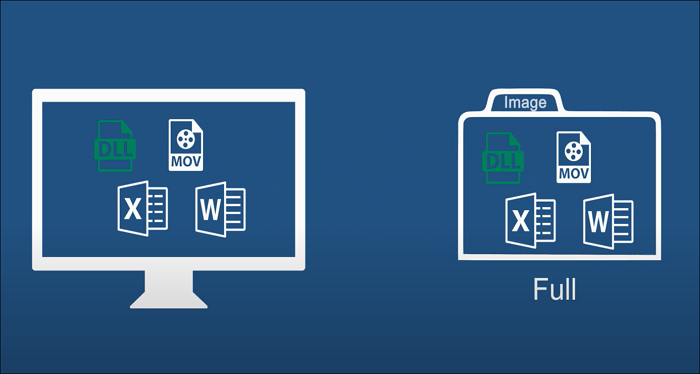What Is Full Backup
The full backup is one of the three types of computer backup. It is a scheme to create copies of all data files in a single backup to maintain data security.
This type of backup can support users to completely save their operating system, files, various settings, and other required data, that is, a full backup can create a complete copy of the source data set. In other words, when you restore the data backed up using the full backup method to another computer, you will find that this computer is no different from the original computer.

Compared with incremental backup and differential backup, the full backup is The fastest and simplest backup scheme. But its advantages and disadvantages are obvious.
The Advantages of Full Backup
Backup can maintain your data security, and prevent computer systems and files from encountering data disasters or computer viruses, resulting in irreparable data damage.
Among the 3 backup schemes of full backup, incremental backup, and differential backup, the full backup is the backup method that many enterprises and individual users will use regularly. The reasons are as follows:
- The full backup can completely protect your system files without the risk of data loss.
- The full backup can quickly restore all files and data, including various settings.
- Managing full backups is easy. Users can create a separate backup each time.
- Full backup enables users to delete previous old copies and create new backup files with great ease.
- Users can search and find the desired files in the full backup, and the whole operation process is very simple.
The Disadvantages of Full Backup
Although full backup can provide users with good data security, everything has two sides. While showing many advantages, some disadvantages of full backup are also exposed. Before considering using full backup, it's better to pay attention to the following points:
- A full backup will create a copy of all data so that it will occupy a large amount of storage space
- Full backups need a lot of time to create
- There will be redundant and unnecessary data in the backup
- Full backup means you put your eggs in the same basket. In other words, if the backup is damaged, you will lose all data.
Conclusion
In order to prevent your computer from any data disaster, you should carefully save your data and regularly back up your computer.
Among the three backup types of full backup, differential backup, and incremental backup, full backup has obvious pros. It can provide more comprehensive copies of all your data, including systems, files, and personal settings, and can complete data recovery in another device at a very fast speed. However, it also has shortcomings that cannot be ignored. Creating a full backup requires a lot of time, storage space, and safety control.
After understanding the advantages and disadvantages of the full backup, you can compare the other two backup modes and customize the backup scheme that is most suitable for you.
- Tip
- You can read this post to learn more detailed information about full backup.
Was This Page Helpful?
Daisy is the Senior editor of the writing team for EaseUS. She has been working at EaseUS for over ten years, starting as a technical writer and moving on to being a team leader of the content group. As a professional author for over ten years, she writes a lot to help people overcome their tech troubles.
Written by Rel
Rel has always maintained a strong curiosity about the computer field and is committed to the research of the most efficient and practical computer problem solutions.
Related Articles
-
MS-DOS Commands [Everything You Need to Know]
 Tracy King/2024-01-11
Tracy King/2024-01-11 -
macOS exFAT | How to Fix exFAT Not Mounting on macOS Ventura/Monterey/Big Sur
 Daisy/2024-01-11
Daisy/2024-01-11 -
Discord Hardware Acceleration: Everything You Need to Know
 Daisy/2024-01-11
Daisy/2024-01-11 -
Windows 11 Is Affecting Performance on AMD CPUs, Fixes Are Coming Soon
 Cedric/2024-01-11
Cedric/2024-01-11
